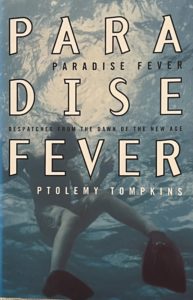Paradise Fever


C.S. Lewis once remarked that there are basically two kinds of writer: the kind who writes a different book every time, and the kind who writes the same book over and over again. I am definitely the latter kind. Consider Paradise Fever, which on its surface appears to be a confessional designed (rather unsuccessfully) to capitalize on the mid-90s memoir craze inaugurated by Mary Karr’s The Liar’s Club and Frank McCourt’s Angela’s Ashes. Beneath that surface, it’s just another book about the same subjects that I’d been continuing to think and to write about ever since the early eighties, when people like Robert Bly, James Hillman, and Joseph Campbell taught me how to do so.
The first third of the book documents the heady years of the early seventies when my father, in the wake of the success of his two biggest books, Secrets of the Great Pyramid and The Secret Life of Plants, took his (for lack of a better word) mistress, Betty Vreeland, into our house to live with him, my mother, and me. The middle third focuses on my father’s very hands-on search for Atlantis in the same area of the Bahamas that I returned to during the psychic treasure hunt I took part in a decade or so later. The final third of the book reads to some degree like a standard substance-abuse memoir, but just beneath all that my usual preoccupations with the spiritual world, and our deeply problematic relationship to it, unfold as per usual.
Everyone knows the modern world is getting smaller: that there are too many people, not enough resources, not enough space. But it’s getting smaller in another way too – at least to my way of thinking. It’s getting smaller in the way that the shell on an insect or crustacean is getting smaller when it’s time for it to break out of it. It’s getting smaller the way Alice’s house does in Alice in Wonderland, when she suddenly finds her head and limbs sticking through its roof and windows. We live in a universe of change and evolution – of (largely) forward movement (a la Hegel, the German Romantics, Jean Gebser, Ken Wilber, and so forth), and it seems to me that this evolutionary story is a spiritual as well as a physical one. In line with this, we are all, these days (to shift a bit from the Alice image), in the position of a grub that is supposed to emerge from a chrysalis, but which seems to be stuck inside, unable to find the catch to the thing that will allow it to unzip it and emerge and unfold its glorious, un-grub-like wings.
There’s a scene in Night of the Living Dead – once again, George Romero’s 1968 version – that sums up all of this for me. The main characters have been locked in the farmhouse for several hours, with the cannibalistic zombies milling around outside, trying to figure out how to get in. Finally, after a lot of arguing, the leaders of the group determine to attempt an escape. While one of them goes up to a second-floor window and tosses some home-made Molotov cocktails to back the zombies off, two other characters open the front door and rush down to a truck parked in front of the house. All looks to be going well, when suddenly the girlfriend of one of the characters in the truck appears in the doorway. She steps out onto the porch – the threshold between the warmth, light, and shelter of the inside of the house, and the realm of darkness and death out beyond it. At this critical moment, she pauses. Should she go back inside, or should she run out into the darkness, and – potentially at least — escape from the confines of the house?
It’s at this moment that the group’s leader, who’s down at the truck already, shouts something to the girl on the porch. Six short words that, in my ragtag personal mythology, have come to sum up our precise predicament in the world, and what we need to do to solve it.
“Well if you’re coming come on!”
To look out on the material world and see it as a place that holds no anchor for our interior selves, for our inner sense of identity or me-ness, is to place ourselves in the position of the people stuck in the farmhouse in Night of the Living Dead. Trapped in that lonely, fragile, futureless structure, we find ourselves fending off an encroaching darkness that will either destroy or transform us.
Paradise Fever, set largely in a time when people were extremely excited about personal growth, societal transformation, and so forth, is about two people – my father and me – who either can’t, or won’t, undergo the act of transformation and emergence that is demanded of them. The book’s final pages find me out in the woods behind my father’s barn in West Virginia, sitting in a lawn chair and drunkenly throwing empty beer bottles into the woods around me, in a rather conscious parody of the character tossing the Molotov cocktails at the zombies in Night of the Living Dead. (That’s not to suggest I made the scene up. I really did do all that stuff. It’s just that, well… life’s a symbolic business.) It’s a comic scene obviously, but the basic position I’m in is one that’s repeated again and again, in different ways, in my books: the image of a person (or, as in This Tree, an entire people) hemmed in by a spiritual/physical environment that seems to be closing in on them, demanding that they either change or die.
I’ve long thought that substances like drugs and alcohol can be useful and beneficial because they make us able to directly – if all too often haphazardly and briefly – recover a feeling for the fact that we exist not just in the physical word but within a larger, non-physical environment. An environment that can see us even if we can’t see it, and which is just waiting for us to… do something. That at least has been my own experience, and why I decided that my rather run-of-the-mill drug and alcohol adventures were worth writing about in Paradise Fever. Drugs can open a person up – for a time – to his or her membership in this larger world. Then they stop working, and the cold black water of ordinary existence, with all its ambiguity and tedious spiritual flatness, rushes back in.
In Paradise Fever neither my father nor I get to where we want to go. We don’t, either of us, really transform in that larger way that so much of my writing seems, whether I like it or not, to be concerned with. But the book ends, like most of my books, with the suggestion that this spiritual transformation, and the larger world which that transformation points to, are real. We are all, in fact, going somewhere. A somewhere that is even better than where we came from, and way better than where we are now, and worth, in the end, all the trouble we experience in the meantime.
At the same time, at the other end of the stick, Paradise Fever is about nostalgia. Well, all of my books are about nostalgia to one degree or another, but PF is the most aggressively so. The thing about nostalgia I find most interesting, and very often overlooked, is that we basically come into the world with it. When one is old (like me), and when one spends a lot of time with other old people (again, me), one notices the rather extraordinary amount of time given to thinking about the past. But the interesting thing to me is that young people spend the same amount of time doing this. When one is in one’s thirties, one is nostalgic about one’s twenties. When one is in one’s twenties, one is nostalgic about one’s teens. When one is in one’s teens one is nostalgic about one’s childhood. And when one is a child, one is… (and this is the interesting part) still just as nostalgic as one will be later in life, the difference here being the difficulty in defining the time and place one is nostalgic for.
The most intensely nostalgic period of my life was, hands down, my early childhood. At six or seven, I was drenched with it. There is a dimensionality to that nostalgia that I cannot recover now, but that I very clearly remember having. Certain things would bring it on in real force. Pictures in books, days with certain kinds of weather… and water. The water of oceans, of ponds, of aquariums. I was always being called back in my mind, back then, to some other place, some other condition, that water reminded me of most vividly. I suspect my fixation with books, a fixation that was fully developed in me by the age of six or so, has to do with this as well, for books – first the pictures, and then later even the lines of text, when I was finally able to read them – would throw me back, put me back in the mindset of a peculiar place or condition that I could feel more than I could identify. Where was that place, and why was it so overwhelmingly real? It’s a question I still ask, even though I’ve basically answered it for myself, at least in a mundane, factual sort of way. In those moods, those phases of mind, I was remembering something that happened before I was born into the particular body I inhabit now. In short, I believe in reincarnation. Though I hasten to add that the form of reincarnation I believe in isn’t the cheap variety, wherein one goes into a light hypnotic state and discovers that yes, indeed, one was Mary Queen of Scotts or whatever. I think it’s a fair bit more complex than that.


